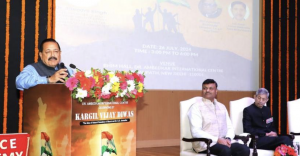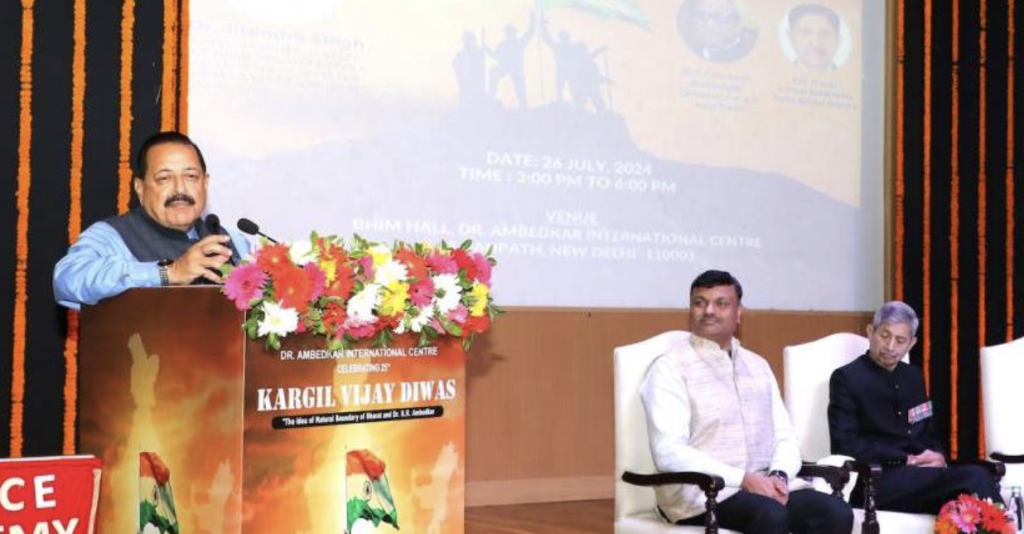NEW DELHI: “Kargil war reaffirmed India’s constant preparedness to defeat enemy designs” said Union Minister Dr. Jitendra Singh.
Addressing the ‘Kargil Vijay Diwas’ programme at Dr Ambedkar International Centre here today ,the Minister said that it sent out a powerful message: whenever the integrity and boundaries of India are challenged, the entire nation rises unitedly to face and defeat its adversaries, regardless of the circumstances. “This conflict highlighted India’s capacity to confront surprises and outsmart even the most cunning enemies”, he said.
According to Dr. Jitendra Singh the Kargil War also symbolised the highest values of secularism enshrined in the Indian ethos, as soldiers on the front lines transcended considerations of caste, creed, religion, or region to fight with singular commitment to Mother India.
Union Minister of State (Independent Charge) for Science and Technology, Minister of State (Independent Charge) for Earth Sciences, MoS PMO, Department of Atomic Energy and Department of Space and MoS Personnel, Public Grievances and Pensions, Dr. Jitendra Singh said “One of the key points underscored by the Kargil War is Pakistan’s continuous reluctance to accept the status of Pakistan-Occupied Jammu and Kashmir (PoJK) as part of India since 1947.
Dr Jitendra Singh said, despite large conventional wars in 1948 and 1965, followed by infiltration bids and a proxy war of “a thousand cuts,” Pakistan never reconciled with this reality. The Kargil conflict reinforced the necessity for India to adapt its political and military strategies.”
Dr Jitendra Singh pointed out that Post-Kargil, significant shifts occurred in India’s approach, particularly after Prime Minister Narendra Modi took office in 2014. Under his leadership, the political dispensation granted the army the autonomy to strike back based on their professional discretion and wisdom. This change in strategy was evident in the surgical strikes and the response to the Pulwama attack, where Indian forces proactively penetrated enemy territory to dismantle sources of aggression. The defence budget was also substantially increased, with a notable allocation of ₹6.22 lakh crore in the interim budget, signalling the government’s priority on national security.
India’s defence sector, once a major importer, has now transformed into a significant exporter of defence equipment. The identification of 5,000 defence-related items that will no longer be imported marks a significant shift towards self-reliance. However, the Kargil War also taught India the importance of vigilance due to the unstable and inconsistent policies in Islamabad and the lack of coordination between Pakistan’s political leadership and its military.
In Kashmir, post the abrogation of Article 370 and the revised defence approach, there has been a visible restoration of peace, reflected in the heavy turnout of tourists. The people of Kashmir have realised the tragic loss of three generations over a flawed dream of freedom propagated by vested interests. Today, the youth of Kashmir are eager to seize the opportunities provided under Prime Minister Modi’s leadership, recognizing the importance of moving forward.
As for PoJK, the unanimously adopted resolution of 1994 clearly states that PoJK is an integral part of India. The resolution also states that the only issue outstanding is how to retrieve PoJK back to India. This enduring commitment underscores India’s unwavering stance on the region and its determination to uphold its territorial integrity.


